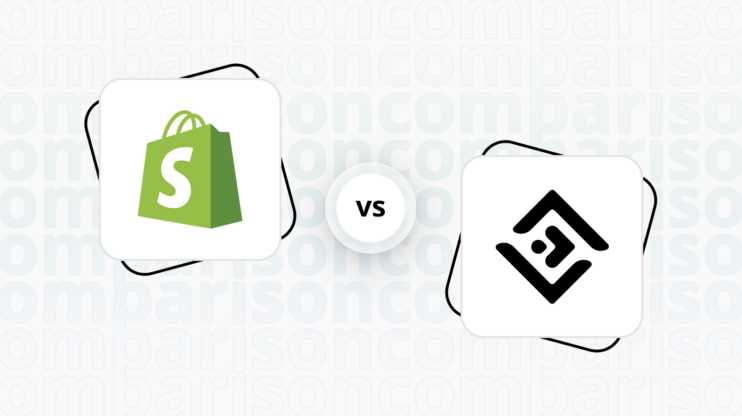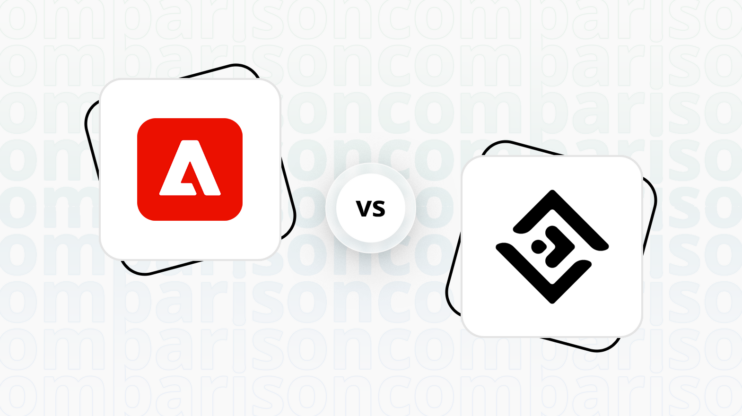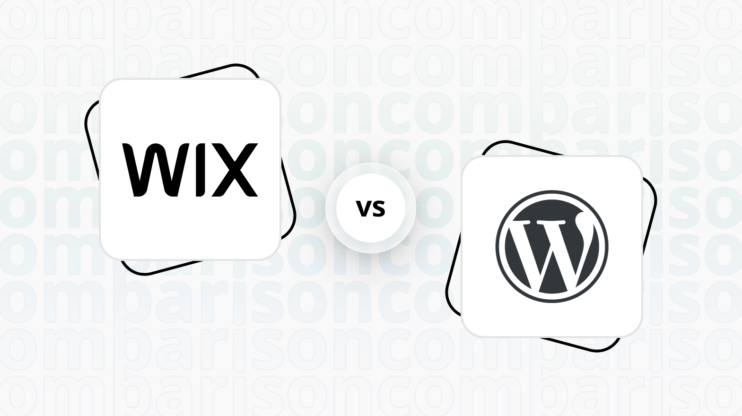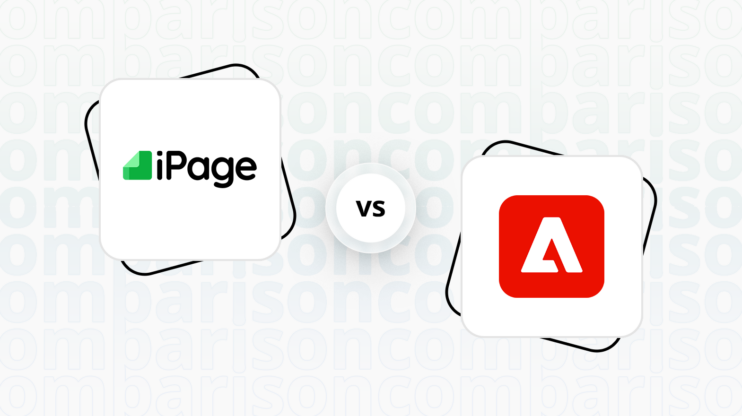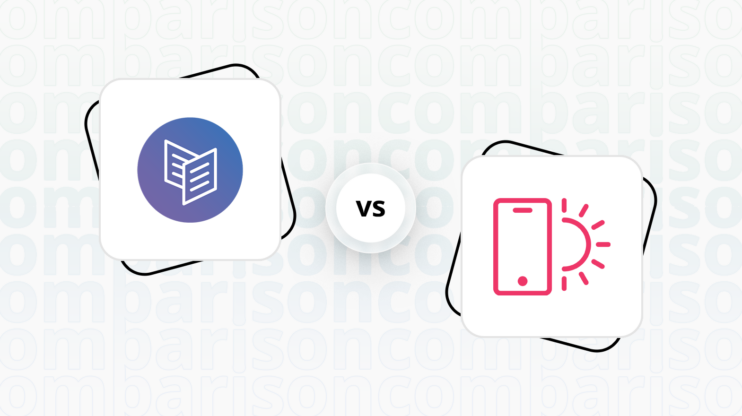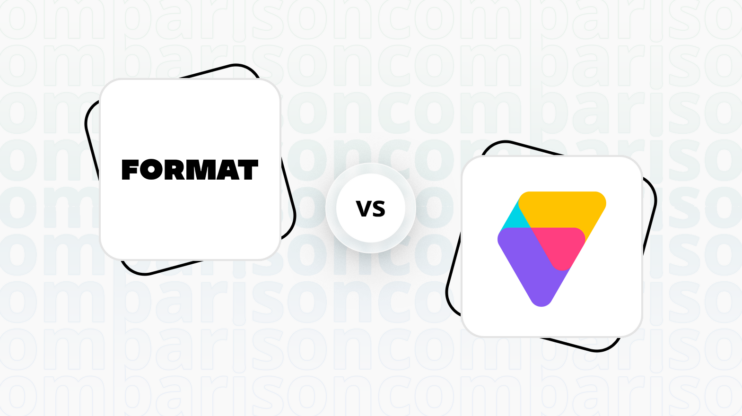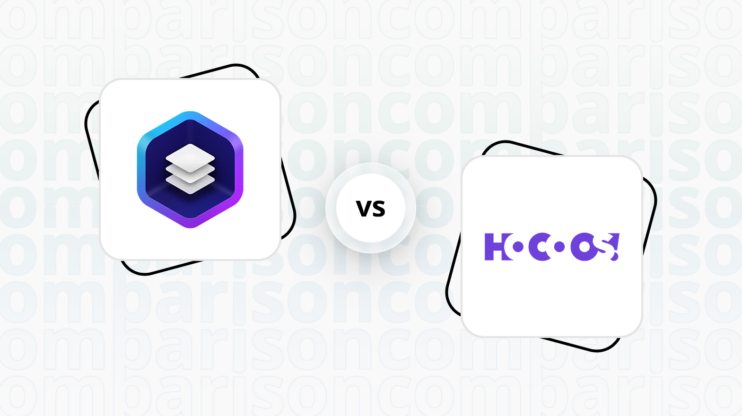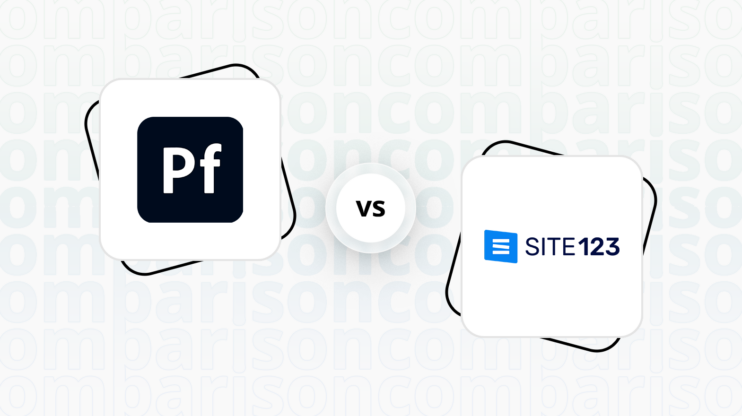Final verdict
Shopify and Adobe Commerce (ex Magento) cater to distinct segments of the ecommerce market, each with its unique strengths.
-
Shopify (Overall Grade: 8.1/10)
excels in providing a user-friendly platform with a comprehensive set of ecommerce features, making it ideal for small to medium-sized businesses looking for an easy-to-use solution with robust support and security. Its strengths in marketing features, customer support, and a wide range of plugins and integrations make it a versatile choice for businesses aiming for growth without needing extensive technical expertise. -
Adobe Commerce (ex Magento) (Overall Grade: 6.9/10),
on the other hand, offers a powerful and flexible platform suited for large businesses and enterprises that require a high level of customization and scalability. With its strong focus on advanced ecommerce features, user management, and the ability to handle complex ecommerce operations, Adobe Commerce is the go-to choice for businesses with specific needs that demand extensive customization and control over their online presence.

|

|
|
|---|---|---|
|
Design functionalities & templates |
8.2 |
6.7 |
|
Ease of use |
7.5 |
5.4 |
|
Ecommerce |
9.2 |
9.4 |
|
Website Editors |
7.9 |
7.8 |
|
Product testing options |
8.1 |
3.9 |
|
Price |
8.2 |
5.8 |
|
Hosting quality |
9.0 |
8.1 |
|
Website speed optimization |
7.8 |
6.6 |
|
Plugins and integrations |
8.7 |
9.1 |
|
Marketing features |
8.8 |
8.1 |
|
Customer support |
8.6 |
8.3 |
|
Security |
9.0 |
8.4 |
|
AI capabilities |
7.9 |
7.7 |
|
User Management |
6.5 |
8.0 |
| Overall |
8.1 |
6.9 |
Best for ecommerce
 9.2
9.2
 9.4
9.4
Verdict
: Shopify shines for small to medium-sized businesses with its user-friendly platform and comprehensive features. Adobe Commerce (ex Magento), with a slightly higher ecommerce score, is the go-to for larger enterprises requiring extensive customization and scalability.
-
Shopify
: Offers an all-in-one solution for ecommerce with a focus on ease of use, making it ideal for entrepreneurs and small to medium-sized businesses. Its features like Shopify Payments, advanced inventory management, and multi-channel selling cater well to growing online stores. -
Adobe Commerce (ex Magento)
: Tailored for large businesses and enterprises, it provides a robust platform with advanced customization, AI-driven personalization, and scalability. Its integration capabilities and extensive developer tools make it suitable for complex ecommerce operations.
Best for informational & business websites
 6.8
6.8
 7.4
7.4
Verdict
: Adobe Commerce (ex Magento) slightly edges out Shopify for informational and business websites, thanks to its higher customization capabilities and flexibility, despite Shopify’s user-friendly approach.
-
Shopify
: Known for its simplicity and ecommerce strength, Shopify offers a straightforward platform for business websites. However, its focus on online stores means it might not always provide the depth of customization that a purely informational site could require. -
Adobe Commerce (ex Magento)
: With a higher score in this category, Adobe Commerce stands out for its robust customization options and flexibility, making it better suited for businesses looking for a more tailored informational website experience.
Detailed comparison
Design functionalities & templates
Design FunctionalitiesRepresents how well each platform allows for creative design and customization of websites.Score Components:
- Template Variety (30%): Range and quality of design templates.
- Customization (30%): Flexibility and options for design alterations.
- User Interface (20%): Ease and intuitiveness of the design process.
- Responsiveness (10%): Adaptability to different devices and screen sizes.
- Innovation (10%): Unique design features and tools.
 8.2
8.2
 6.7
6.7
🏆
Winner: Shopify.
If you’re looking for a platform that offers sleek and professional templates ideal for ecommerce sites, Shopify is the preferred choice.
Shopify’s templates offer a sophisticated look with a focus on online stores. While the free template selection is not large, Shopify’s premium theme store provides a variety of industry-specific options, offering advanced features for a strong brand presence.
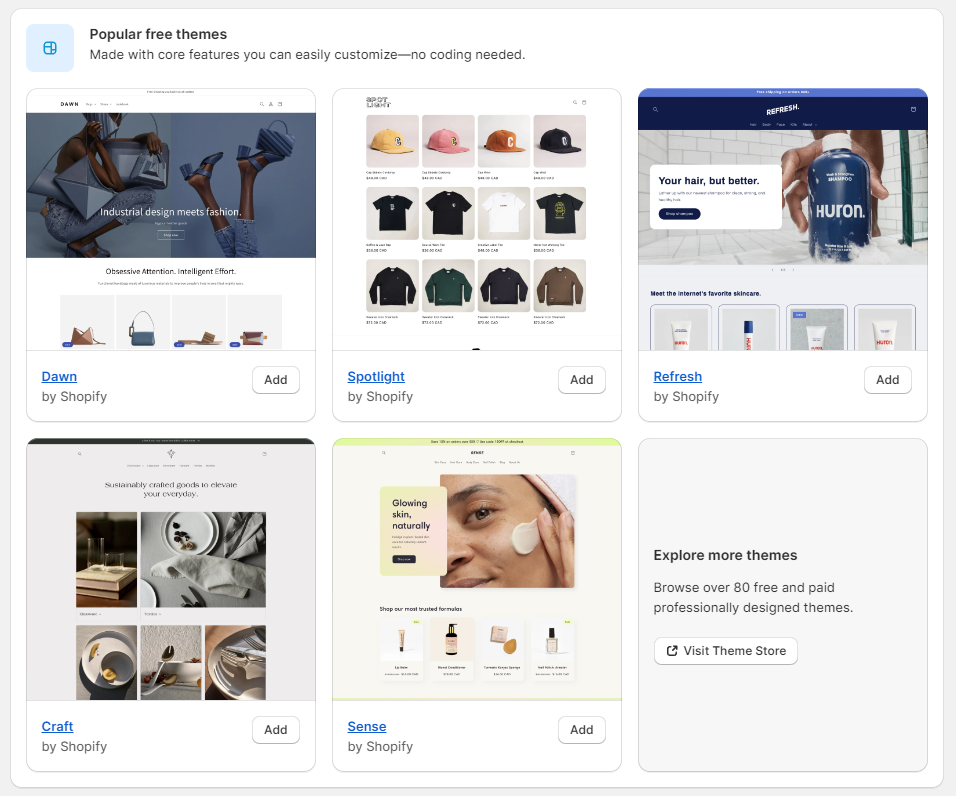
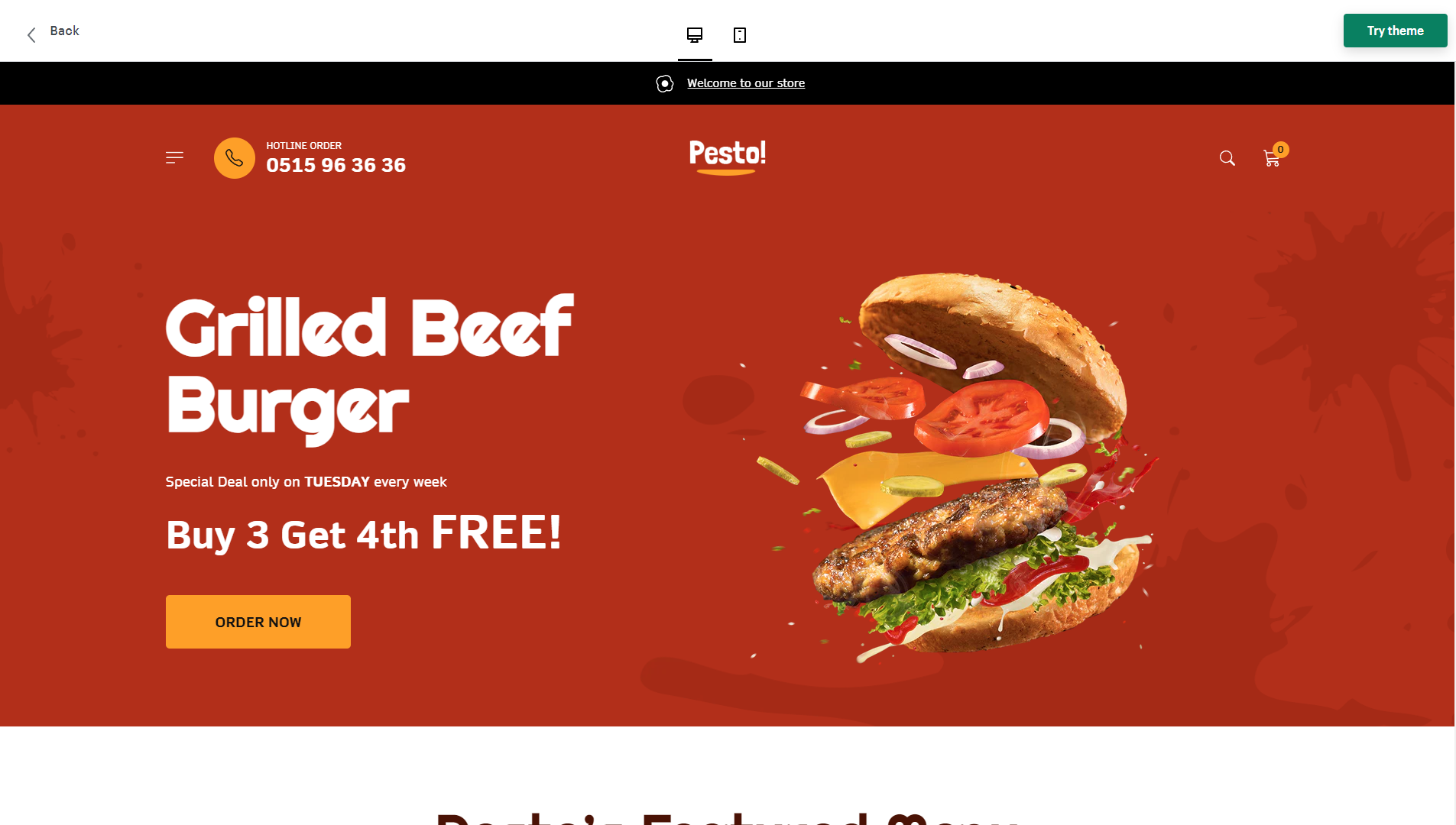
On the other hand, Adobe Commerce (ex Magento) prioritizes flexibility over pre-built templates. While it offers a limited selection of base themes, users can access third-party themes for customization. Theme options are highly adaptable, allowing changes to layouts, colors, fonts, and the creation of custom page layouts.
Adobe Commerce(ex Magento) Themes
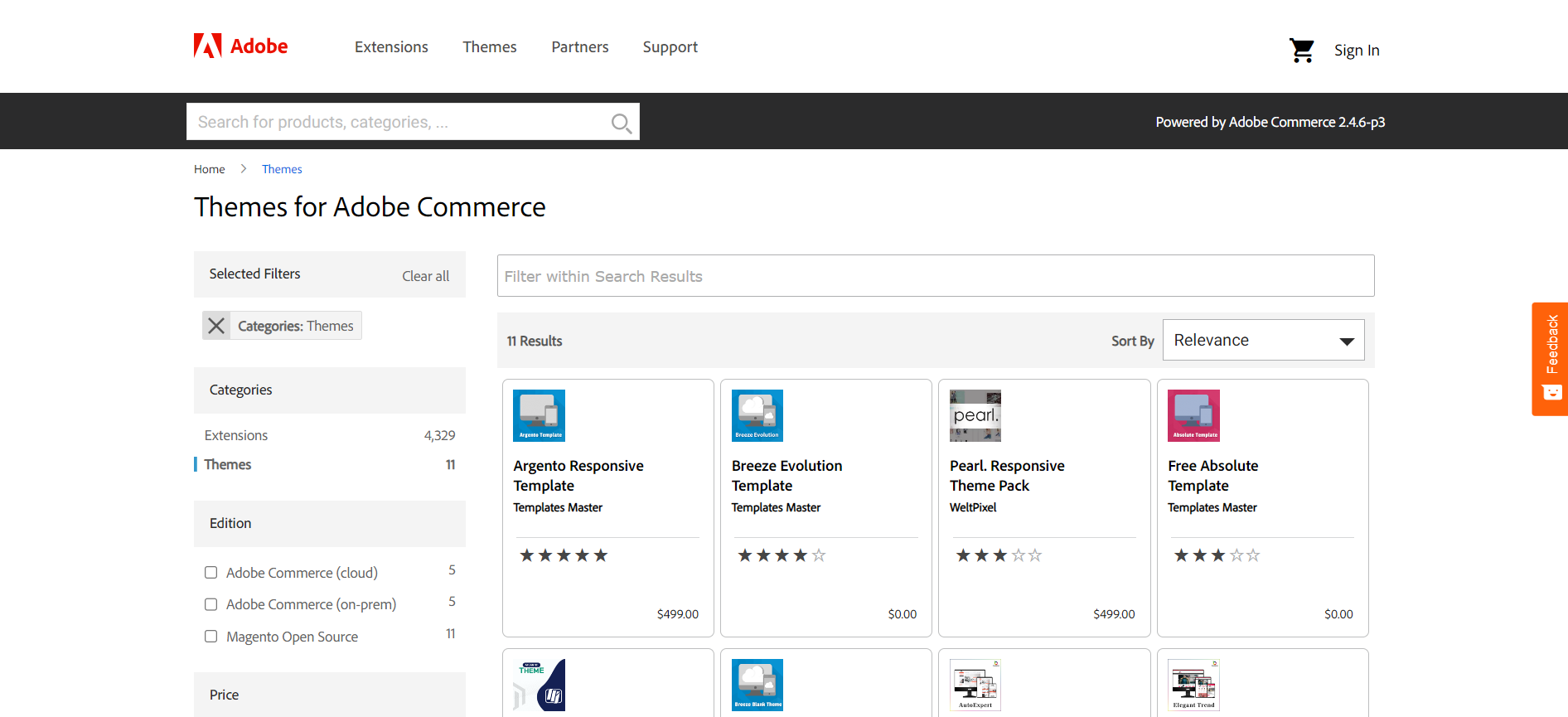
Get a head start on website creation with AI
Create a custom website tailored to your business needs 10X faster with 10Web AI Website Builder!
Ease of use
Ease of useReflects the platform’s overall user-friendliness.Score
Components:
- Learning curve (40%): Quickness and ease of getting started.
- Interface design (30%): Simplicity and intuitiveness of layout.
- User guidance (20%): Quality of tutorials and support.
- Flexibility (10%): Adaptability to various user skills.
 7.5
7.5
 5.4
5.4
🏆 Winner: Shopify
. With a score of 7.5, Shopify is widely praised for its exceptional ease of use, offering a drag-and-drop interface, intuitive layout, pre-built templates, and extensive resources for beginners. On the other hand, Adobe Commerce(ex Magento), scoring 5.4, is known for its high customization capabilities and scalability, but its complexity can pose challenges for beginners without technical expertise.
Learning Resources
🏆 Winner: Adobe Commerce(ex Magento)
. Both platforms offer solid learning resources, but Adobe Commerce(ex Magento) provides a comprehensive array of learning resources, including videos, tutorials, and instructor-led courses through Adobe Digital Learning Services, covering everything from basic store management to advanced catalog and product management.
For ecommerce
EcommerceMeasures the platform’s effectiveness in supporting online business activities.Score Components:
- Ecommerce themes and templates (20%): Variety and design of templates.
- Product management (25%): Ease of managing and organizing products.
- Payment options (25%): Variety and convenience of payment methods.
- Ecommerce features (20%): Features for managing an ecommerce store.
- Integration (10%): Compatibility with external e-commerce tools and services.
 9.2
9.2
 9.4
9.4
Shopify and Adobe Commerce (ex Magento) are both powerful ecommerce platforms, but they cater to different needs. Shopify is known for its simplicity and ease of use, making it a great choice for small to medium-sized businesses. On the other hand, Adobe Commerce, with its robust and customizable features, is more suited for large businesses and enterprises.

|

|
|
|---|---|---|
|
Ecommerce themes and templates |
8.2 |
7.5 |
|
Product page customization |
8.5 |
9.0 |
|
Payment processing and commissions |
8.8 |
7.8 |
|
POS capabilities |
8.1 |
7.0 |
|
Payment gateways |
9.5 |
8.5 |
|
Product numbers |
9.0 |
7.5 |
|
Additional ecommerce features |
9.1 |
8.0 |
Shopify ecommerce features:
- Comprehensive store builder
- Shopify Payments and other gateways
- Advanced inventory management
- Multi-channel selling
- Abandoned cart recovery
- Detailed analytics and reporting
Adobe Commerce ecommerce features:
- Product and Inventory Management
- Order Management
- Customer Management
- Marketing and Promotions
- Payment Processing
- Multi-Channel Commerce
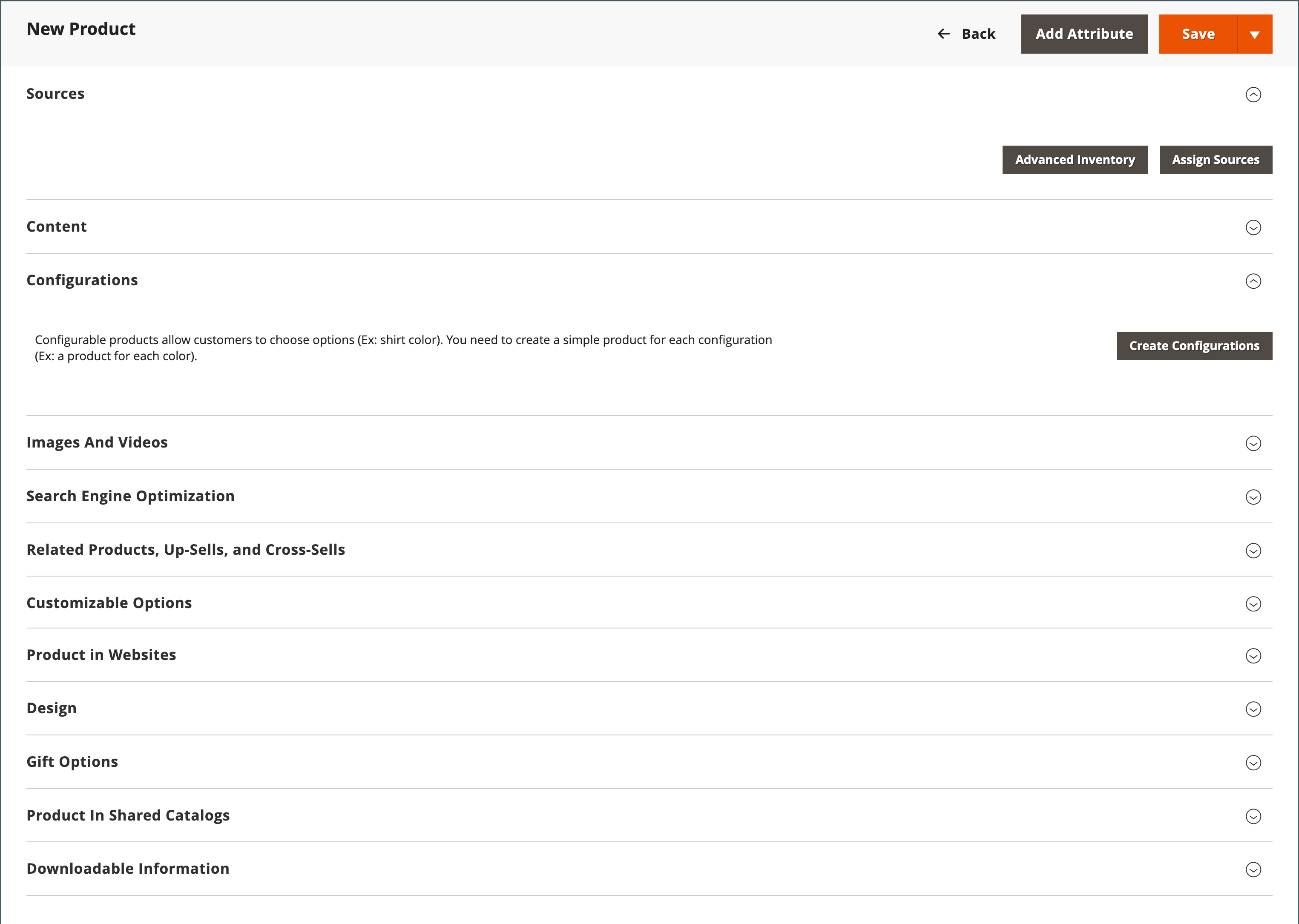
Ecommerce themes & templates
Shopify offers about 150 modern responsive themes for creating a virtual storefront, ensuring a good look on both desktop and mobile devices. While some themes are free, others cost between $170 to $380. Adobe Commerce, powered by Magento, offers a comprehensive ecosystem for ecommerce themes and templates, enabling businesses to customize their online stores to meet specific branding and functionality requirements.
Product page customization
Shopify has a limit of three options per product, totaling 100 unique variations. This limit may not pose a significant constraint, and it is suggested that for products with numerous options, creating separate listings on Shopify can be a more manageable approach. Adobe Commerce, on the other hand, offers extensive customization options for product pages, enabling businesses to enhance the user experience and tailor product displays to their specific needs.
Payment processing
When it comes to payment processing, Shopify offers payments with typical charges of 2.9% + 30¢ per online transaction on basic plans, and lower fees for higher-tier plans. However, it adds extra fees for using other payment gateways. Adobe Commerce offers integrated payment solutions and commission management for seamless online transactions, alongside POS integration for omnichannel retail experiences. It supports a wide array of payment gateways, ensuring flexible and secure payment options for customers.
In conclusion, while Shopify is a great choice for businesses looking for an easy-to-use platform with a comprehensive set of ecommerce features, Adobe Commerce is a more robust and flexible solution that can cater to the complex needs of larger businesses and enterprises.
Website Editors
Website EditorsEvaluates the platforms’ website building and editing capabilities.Score Components:
- Customization tools (40%): Range and power of editing features.
- Editor usability (30%): User experience within the editor.
- Design flexibility (20%): Freedom in layout and design changes.
- Update and maintenance ease (10%): Simplicity of updating and maintaining the site.
 7.9
7.9
 7.8
7.8
🏆
Winner: Shopify
. Shopify, with a score of 7.9, excels in providing a streamlined, ecommerce-focused editing experience. It’s particularly beneficial for users who prioritize efficient management of online stores. The editor is straightforward, making it easy to add products, manage inventory, and set up payment methods. Shopify’s editor is optimized for sales and business growth, with built-in tools specifically designed for ecommerce businesses.
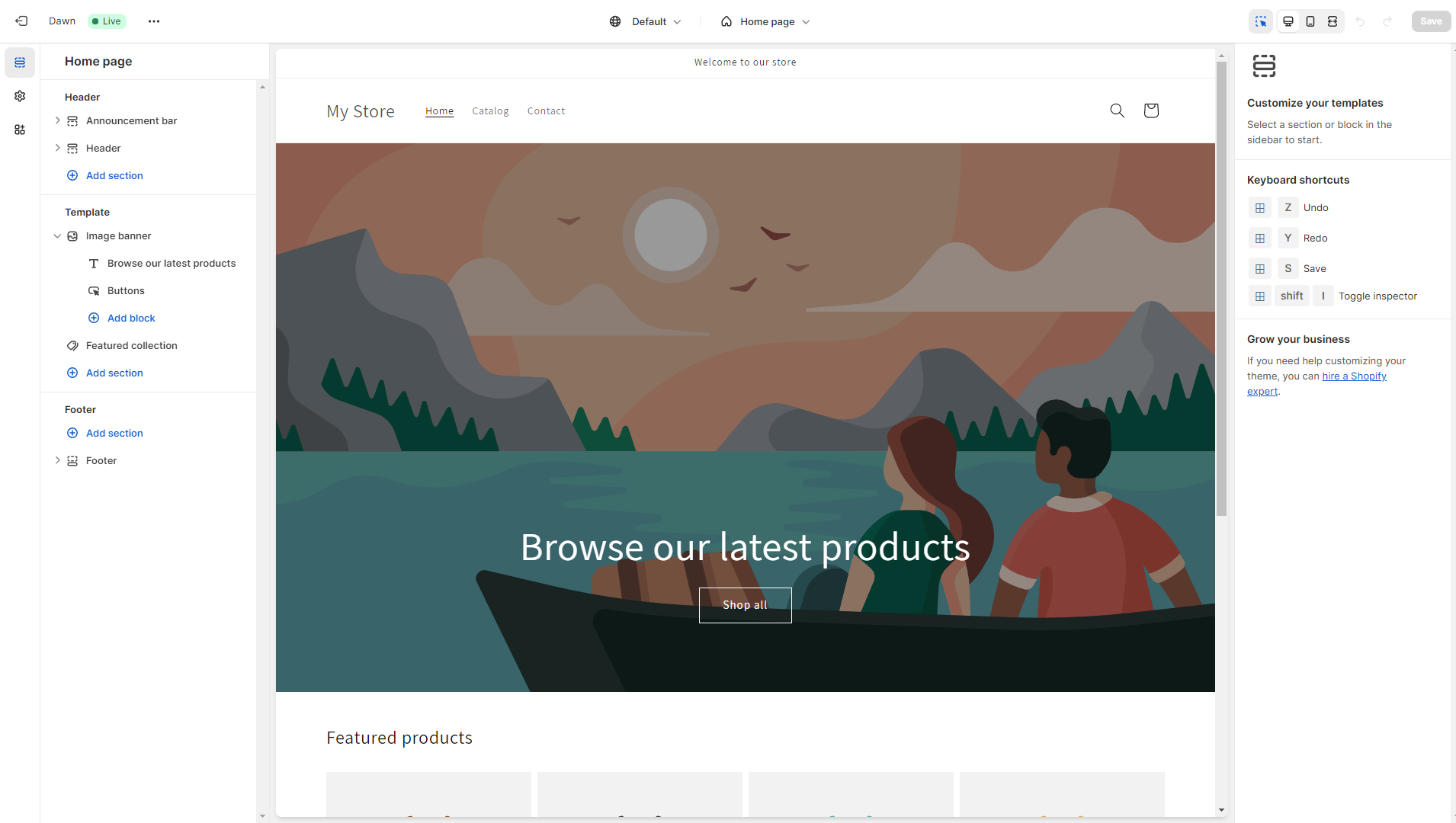
Adobe Commerce, previously known as Magento Commerce, scoring 7.8, is a robust ecommerce platform designed for flexibility and scalability, enabling businesses to create customized online stores with extensive features for product management, customer engagement, and analytics. It supports both B2B and B2C models and offers a range of tools for marketing, SEO, and inventory management, along with a vast ecosystem of extensions. Suitable for businesses of all sizes, Adobe Commerce provides options for cloud-hosting or self-hosting, catering to a wide array of ecommerce needs.
Mobile editor/app
 8.0
8.0
 0
0
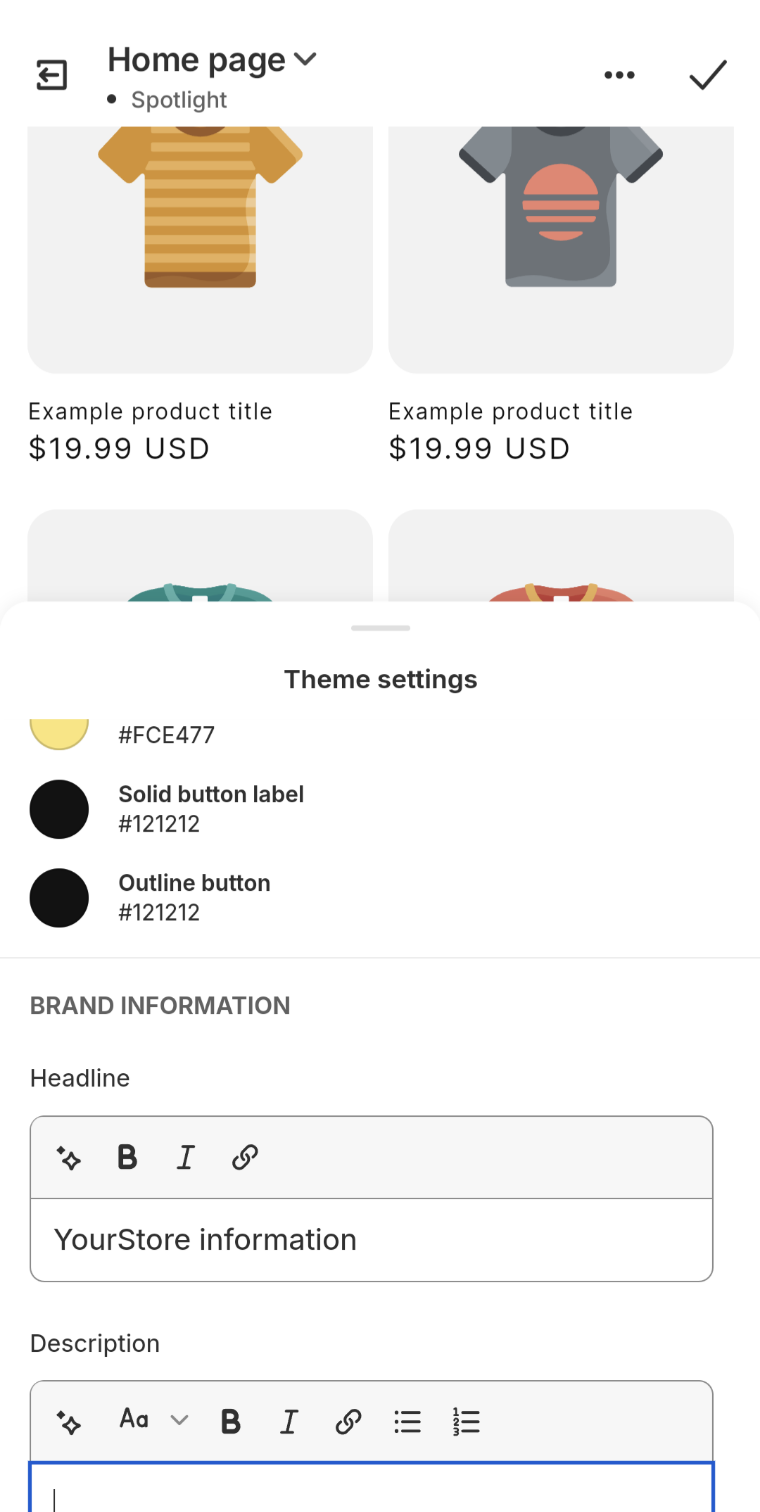
🏆
Winner: Shopify
. Shopify offers a mobile app that includes a user-friendly mobile theme editor. This feature allows users to customize their online store website directly from their mobile device, enabling the addition, removal, editing, and rearrangement of content on the store’s website. This offers convenient on-the-go adjustments to the store’s appearance and layout.
On the other hand, Adobe Commerce (ex Magento) does not offer a dedicated mobile app for website editing at this time. Therefore, Shopify is the clear winner in this category due to its mobile editing capabilities.
Product testing options
Product Testing OptionsAssesses the options for trying out platform features before commitment.Score Components:
- Trial quality (40%): Extent and usefulness of the trial or free version.
- Feature accessibility (30%): How many features are available to test.
- Trial duration (20%): Length of the trial period.
- Ease of transition (10%): Smoothness of moving from trial to paid plans.
 8.1
8.1
 3.9
3.9
Overall Result
:
Shopify Wins
. Shopify scores 8.1, offering a 14-day free trial with access to all features, while Adobe Commerce(ex Magento) scores 3.9, with no free or trial version but the possibility to test premium features by requesting a demo.

|

|
|
|---|---|---|
|
Free Plan |
No (14-day free trial) | No |
|
Trial Duration |
14 days | No |
|
Testing Premium Features |
All features during free trial |
By requesting a demo |
|
Money Back Guarantee |
No (Account closes after trial) | No |
Price
PriceLooks at the cost-effectiveness and value for money of each platform.Score Components:
- Plan value (40%): What each pricing tier offers.
- Transparency and clarity (30%): Clearness of pricing structures.
- Flexibility of plans (20%): Range of options to suit different budgets.
- Hidden costs (10%): Additional expenses not included in the plan.
 8.2
8.2
 5.8
5.8
Shopify offers a more transparent and straightforward pricing structure, while Adobe Commerce (ex Magento) caters to larger businesses with custom pricing.

|

|
|
|---|---|---|
|
$20-$30 |
Shopify Basic ($29/month): Unlimited products, 2.9% + 30¢ card fee with Shopify payments, Extra 2% gateway fee without Shopify Payments, Abandoned cart recovery, Automated sales tax, Digital products, POS Integration, 2 staff accounts. Value for price: 8.0 |
No offering at this amount. |
|
$70-$80 |
Shopify Standard ($79/month): Lower card fees (2.6% + 30¢), Gift cards, Professional reports, 5 staff accounts. Value for price: 8.5 |
No offering at this amount. |
|
$200-$300 |
Advanced Shopify ($299/month): Lowest card fees (2.49% + 30¢), Advanced report builder, Real-time carrier shipping, Up to 15 staff accounts Value for price: 8.8 |
No offering at this amount. |
|
$2000+ |
No offering at this amount. |
Adobe Commerce Pro and Managed Services ($2000/month): Adobe Commerce Pro and Managed Services are designed to deliver scalable, secure, and extensive eCommerce solutions tailored to a wide range of business demands. It offers a comprehensive set of ecommerce tools, including product and inventory management, efficient order processing, customer account management, targeted marketing capabilities, diverse payment processing options, robust security measures, and scalability to accommodate business growth. It also offers both self-hosted and cloud-hosted options, providing flexibility and optimized performance. While it does not have an AI website builder, it offers a powerful theme framework for comprehensive control, including frontend editing for basic adjustments. Experienced developers can employ custom code for unique designs and advanced functionalities. |
location. As a result in rare cases the prices displayed here can differ from the ones you see on their
websites.
Hosting quality
Hosting
qualityExamines the reliability and performance of the hosting solutions.Score Components:
- Uptime (40%): Consistency and reliability of website availability.
- Speed (30%): Loading times and performance.
- Bandwidth and storage (20%): Sufficiency of resources provided.
- Data centers (10%): Quality and distribution of hosting infrastructure.
 9.0
9.0
 8.1
8.1
🏆
Winner: Shopify
Shopify excels with proprietary e-commerce-focused cloud hosting, boasting a 99.99% uptime guarantee and strategic global data centers. It’s ideal for high-traffic online stores. Adobe Commerce(ex Magento), with its flexible self-hosted and managed hosting options, provides robust and scalable eCommerce solutions. However, the lack of publicly available information about their data centers and uptime makes Shopify a more reliable choice, earning it a higher rating.

|

|
|
|---|---|---|
|
Do they offer hosting? |
Yes, included in all paid plans |
Yes, offers both self-hosted and cloud-hosted options |
|
Data Centers: |
5 globally: USA (Ashburn, Virginia; Santa Clara, California), Canada (Toronto, Ontario), Ireland (Dublin), and Singapore |
Leverages Amazon Web Services (AWS), Specific data center details not publicly available |
|
Type of hosting: |
Proprietary cloud-based hosting |
Self Hosting, Managed Hosting |
|
Uptime: |
99.99% |
Uptime Guarantee for Adobe Managed hosting is provided |
|
Uptime Guarantee: |
Yes, 99.99% |
Yes, for Adobe Managed hosting |
Website Speed Optimization
Website Speed OptimizationEvaluates optimization of website loading timesScore Components:
- PageSpeed Score (30%): Google’s score indicating performance optimization.
- Loading Time (30%): The average time until a website is fully interactive.
- Mobile Optimization (15%): Optimization effectiveness for mobile devices.
- Resource Optimization (15%): Optimizing images, scripts, and other heavy resources.
- CDN Usage (10%): Use of CDN to enhance speed across geolocations.
 7.8
7.8
 6.6
6.6
🏆 Winner: Shopify
Both Shopify and Adobe Commerce (ex Magento) place a high priority on website performance and page speed, with Shopify focusing on app efficiency and theme optimization, and Adobe Commerce (ex Magento) emphasizing CDN, database optimization, caching, and indexing. However, Shopify gets a slight edge when it comes to website speed optimization.

|

|
|
|---|---|---|
|
Focus |
App efficiency, Theme optimization |
CDN, Database optimization, Caching, Indexing |
|
Performance Tools |
Google Lighthouse, PageSpeed Insights |
Google PageSpeed Insights, Database optimization tools |
|
Key Strategies |
App efficiency, Theme optimization |
CDN, Database optimization, Caching, Indexing |
|
Load Times |
Varies widely, dependent on optimization |
Varies widely, dependent on optimization |
|
Page Speed Scores Range |
Scores vary; influenced by apps, images |
Scores vary; influenced by plugins, images |
|
Core Web Vitals Improvement |
Emphasis on LCP, FID, CLS improvements |
Emphasis on LCP, FID, CLS improvements |
Shopify’s approach to enhancing site speed includes app optimization by removing unneeded app code, conditionally loading apps, avoiding immediate pop-up displays, and incorporating app functionality directly into themes. This approach leverages Shopify’s fast servers and CDN network to boost load speed. Shopify also suggests utilizing Google AMP for faster mobile page loads, although with some design compromises. Analysis of Shopify sites showed a range of Shopify speed scores, with load times varying widely depending on optimization.
Adobe Commerce (ex Magento), like Shopify, places a strong emphasis on website performance and page speed. Adobe Commerce’s approach to enhancing site speed includes CDN, database optimization, caching, and indexing. Continuous maintenance and optimization are essential for keeping Adobe Commerce sites fast. Analysis of Adobe Commerce sites showed a range of speed scores, with load times varying widely depending on optimization.
Get a head start on website creation with AI
Create a custom website tailored to your business needs 10X faster with 10Web AI Website Builder!
Plugins and integrations
Plugins and integrationsMeasures the range and effectiveness of additional plugins and integrations.Score Components:
- Variety of options (40%): Range of available add-ons.
- Integration smoothness (30%): Ease of integrating plugins into the site.
- Quality of plugins (20%): Functionality and reliability of the options.
- Custom integration capabilities (10%): Support for custom or third-party integrations.
 8.7
8.7
 9.1
9.1
🏆 Winner: Adobe Commerce(ex Magento).
Adobe Commerce(ex Magento) scores 9.1, outperforming Shopify’s 8.7. Adobe Commerce(ex Magento) offers a vast array of extensions and plugins, estimated to be in the tens of thousands, covering aspects such as marketing, payment processing, shipping, content management, security, and optimization. This flexibility makes Adobe Commerce a powerful platform for creating tailored ecommerce experiences. Shopify, while offering over 8,000 apps in its App Store, falls short in comparison to the extensive range of plugins and integrations offered by Adobe Commerce(ex Magento).
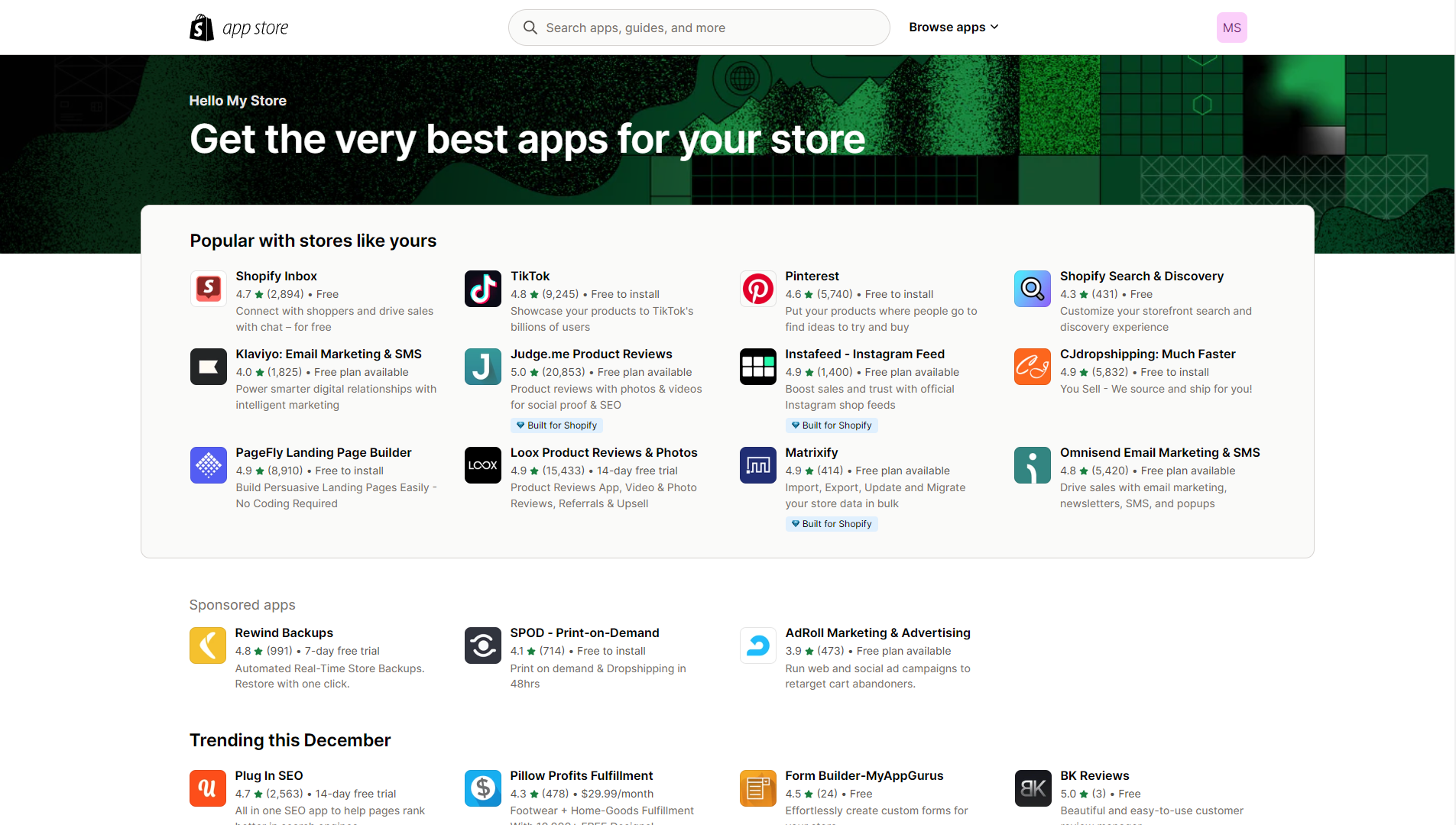
Adobe Commerce(ex Magento) Applications
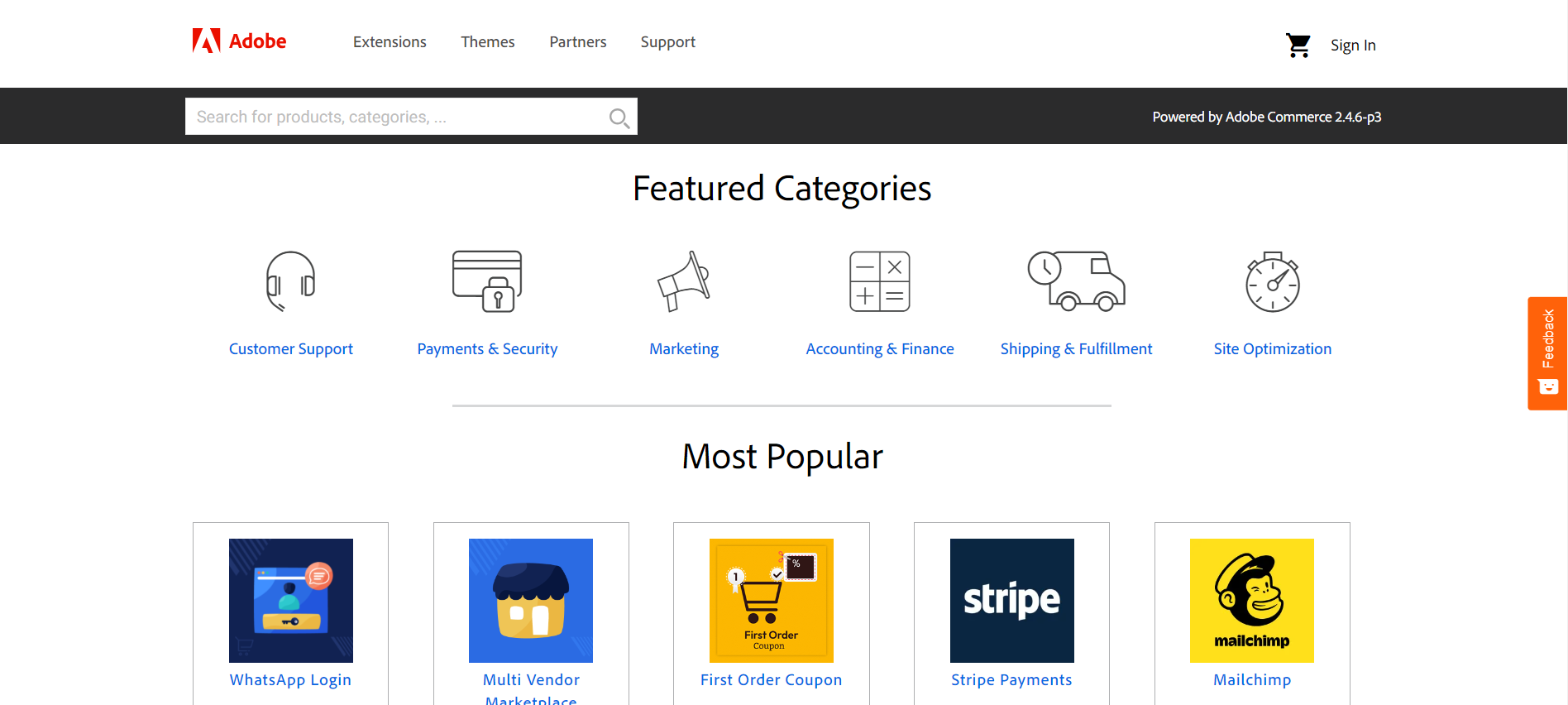
Marketing Features
Marketing featuresAssesses tools and options available for marketing.Score Components:
- SEO tools (40%): Effectiveness of SEO features.
- Marketing automation (30%): Availability and quality of marketing tools.
- Social Media integration (20%): Ease and depth of social media connectivity.
- Email marketing (10%): Quality and usability of email marketing tools.
 8.8
8.8
 8.1
8.1
🏆
Overall Winner: Shopify
. Shopify stands out for its more advanced ecommerce-focused marketing tools, especially in analytics and ad campaign management. Adobe Commerce(ex Magento) also offers a robust set of marketing features, making it a strong contender.

|

|
|
|---|---|---|
|
SEO Tools |
|
|
|
Email Marketing |
|
|
|
Blogging |
|
Can be integrated with platforms like WordPress |
|
Social Media Integration |
Advanced integration for selling directly on social platforms |
|
|
Analytics and Reporting |
Detailed analytics for in-depth insights |
Integrates with Google Analytics and other tools |
|
Ads and Promotions |
Google Ads integration; sophisticated ad campaign management |
Advanced tools for creating and managing promotions |
Customer Support
Customer supportEvaluates the quality and availability of support options.Score Components:
- Response time (40%): Speed of support responses.
- Support quality (30%): Effectiveness and helpfulness of the support.
- Availability (20%): Range of support channels (phone, chat, email).
- Resource richness (10%): Quality of self-help and educational materials.
 8.6
8.6
 8.3
8.3
🏆 Winner: Shopify
. Shopify edges out Adobe Commerce(ex Magento) in this category with a customer support score of 8.6 compared to Adobe Commerce(ex Magento)’s 8.3. Shopify provides 24/7 support through chat, email, and phone. The tutorials are typically clear and beneficial, and the extensive community ensures that answers can be found in the numerous forum threads. Additionally, Shopify’s outstanding marketing blog offers valuable information on business growth strategies.
Adobe Commerce(ex Magento) also offers customer support through various channels such as phone, email, and live chat. Their support team is available 24/7 to assist with any technical issues or inquiries. Additionally, Adobe Commerce provides a comprehensive knowledge base and community forums for self-help and troubleshooting. Customers can also access support resources such as documentation, user guides, and video tutorials.
Security
SecurityLooks at the platforms’ security measures and data protection.Score Components:
- Data protection (40%): Safeguards for user and customer data.
- SSL and encryption (30%): Implementation of secure connections.
- Compliance (20%): Adherence to industry security standards.
- Regular updates (10%): Frequency of security updates and patches.
 9.0
9.0
 8.4
8.4
🏆
Winner: Shopify
. Shopify’s security measures are comprehensive, including secure infrastructure, encryption, limited access, data minimization, user control and transparency, two-factor authentication, regular audits, and a dedicated incident response team. Shopify also provides SSL certificates for data encryption and identity verification, and a built-in Web Application Firewall to filter and block threats.
Adobe Commerce (ex Magento), on the other hand, also provides secure private data storage and protection through advanced encryption and access control measures. It offers regular security updates and patches to address vulnerabilities, secure payment processing, and tools for monitoring and detecting suspicious activity. However, it falls slightly short of Shopify’s security score, making Shopify the winner in this category.
AI Capabilities
AI capabilitiesMeasures the effectiveness of AI-driven features and tools.Score Components:
- Automation efficiency (40%): Impact of AI on streamlining processes.
- Personalization (30%): AI-driven customization for users or customers.
- AI-Assisted design (20%): Role of AI in website design and functionality.
- Data analysis (10%): Use of AI in interpreting user data and analytics.
 7.9
7.9
 7.7
7.7

|

|
|
|---|---|---|
|
Personalized Design |
|
Adobe Commerce does not have AI website builder |
|
SEO Optimization |
AI-driven recommendations for better search engine visibility |
AI-guided SEO advice for optimal content placement and structure |
|
Customer Behavior Analysis |
Advanced analytics to understand customer preferences |
AI-powered customer behavior analysis |
|
Sales Predictions |
AI-powered sales forecasting tools |
AI-driven sales forecasting |
|
Inventory Management |
AI tools to assist in efficient inventory handling |
AI-powered inventory management |
|
Content Generation |
AI-assisted content generation |
AI-driven content generation and optimization |
🏆 Winner: Shopify
. Shopify, with a score of 7.9, utilizes AI mainly to enhance the ecommerce experience. Its AI features focus on customer behavior analysis, personalized shopping experiences, inventory management, and sales predictions. While Shopify’s AI is powerful, it is more business and data-centric compared to Adobe Commerce’s design-focused AI.
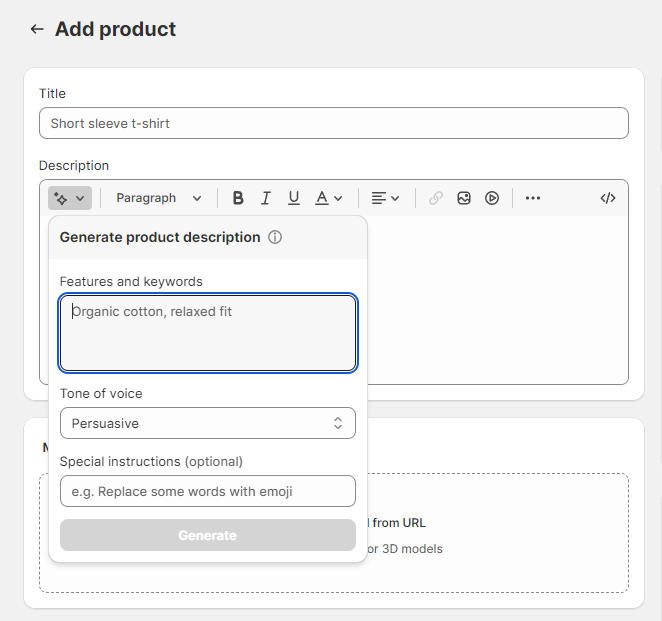
Adobe Commerce, scoring 7.7, integrates AI across various aspects of eCommerce, enhancing customer service, security, and marketing. AI-powered chatbots offer round-the-clock customer service, boosting satisfaction while easing the burden on human teams. In security, AI aids in identifying and mitigating fraudulent transactions, thereby protecting revenue and building customer trust. Moreover, AI-driven marketing automation enables tailored email campaigns and social media strategies, optimizing engagement based on detailed customer data. These AI capabilities streamline operations, foster customer loyalty, and drive efficient marketing strategies.
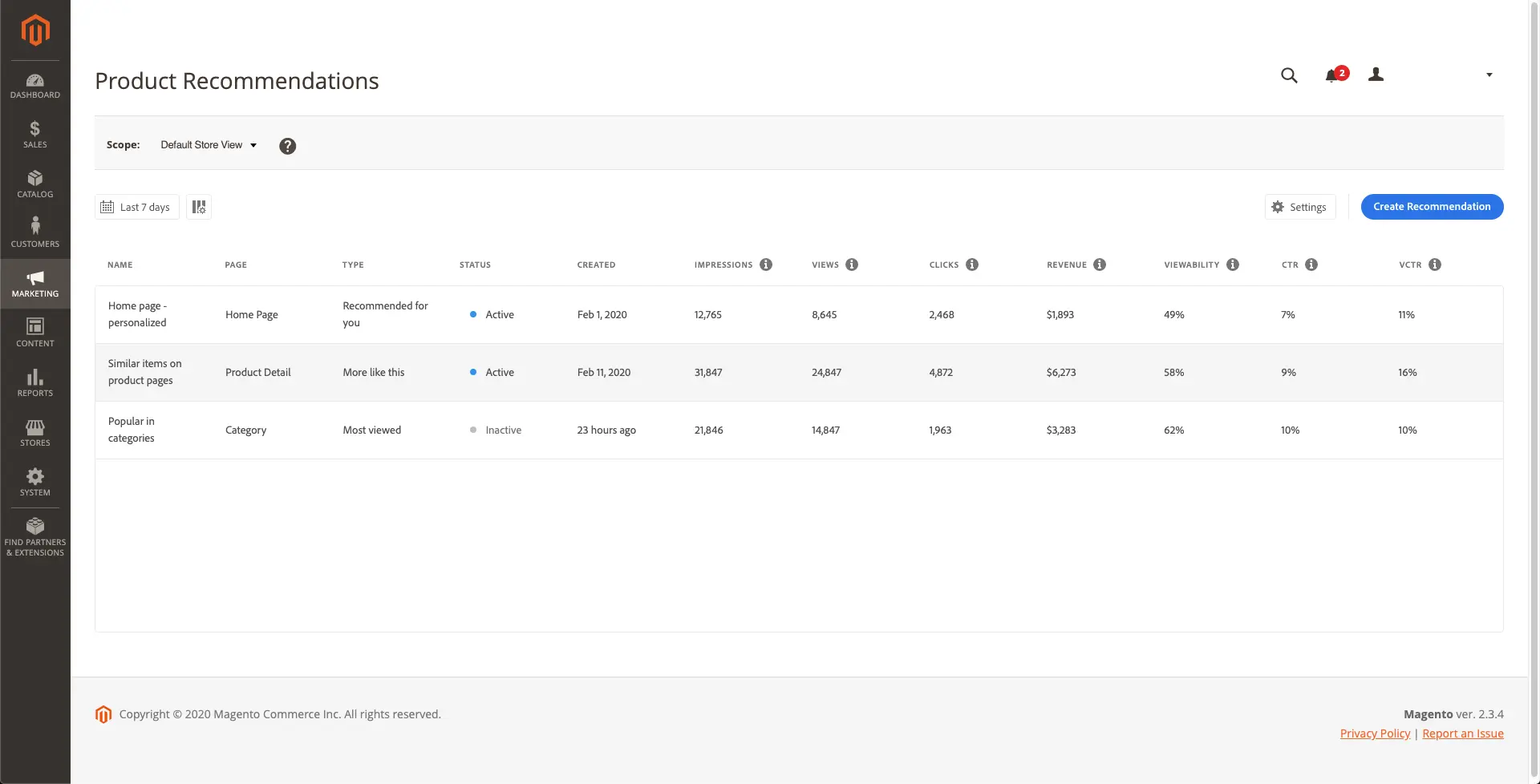
User Management
User ManagementAssesses the platforms’ capabilities in managing user roles, permissions, and accessibility.Score Components:
- Role Customization (40%): Flexibility in creating and defining user roles and
permissions. - Ease of Management (30%): User interface and tools for managing users.
- Access Control (20%): Effectiveness of access control measures for different user
levels. - Scalability (10%): Ability to manage a growing number of users efficiently.
 6.5
6.5
 8.0
8.0
🏆 Winner: Adobe Commerce(ex Magento)
. Managing your online team with Shopify and Adobe Commerce(ex Magento) involves different approaches to website editing access.
-
Shopify enforces staff account limits based on plans, ranging from 2 to 15, with Shopify Plus offering unlimited
accounts. Collaborators with limited access are also an option. - The number of users who can edit an Adobe Commerce website depends on user licenses and roles. User licenses, bought separately, determine the total number of users allowed, with additional licenses purchasable as needed. Roles and permissions, managed within the available licenses, control access and modifications, ensuring data security and efficient workflow.
Both platforms support simultaneous editing. Shopify uses avatar icons to indicate co-workers, while Adobe Commerce(ex Magento) displays a warning for concurrent editing, preventing accidental overwrites.
Shopify User Roles and Access Levels:
| Role | Description | Access Highlights |
|---|---|---|
| Store Owner | Full control over store | Manage products, orders, discounts, payments, apps, settings. Create and manage staff accounts. |
| Staff | Configurable access by owner |
Add/edit products, manage orders, fulfill orders, manage customers, update content. Access level can be customized by the owner. |
| Collaborator | Limited access for external partners | View and manage specific sections like blog or product categories. Cannot access full store settings. |
Adobe Commerce(ex Magento) User Roles and Access Levels:
| Role | Description | Access Highlights |
|---|---|---|
| Administrator | Has full permissions to all aspects of Adobe Commerce, including global settings and data. | Full access to all settings, data, and functionalities within Adobe Commerce. Can manage other users’ roles and permissions. |
| Store Administrator | Responsible for the day-to-day management of the store, including products, orders, and customer service. | Access to manage products, process orders, and handle customer inquiries, but may have restricted access to sensitive global settings or data. |
| Design Team Member | Focuses on the aesthetic and user experience aspects of the store, working on content design and layout. | Access to content design tools and functionalities, but restricted from accessing customer, order information, and other sensitive areas. |
| Default User (B2B) | Has view-only access to company profile and credit information, and full access to activities related to sales and quotes. | Full access to sales and quotes activities; view-only for company profile and credit information. |
| Senior Buyer (B2B) | Engaged in purchasing, with access to all Sales and Quotes resources, and view-only permissions to the Company Profile, User and Teams, Payment Information, and Company Credit. | Comprehensive access to Sales and Quotes, with limited viewing rights for company’s financial and profile data. |
| Assistant Buyer (B2B) | Assists in purchasing activities, with permissions to place orders using Checkout with Quote, and to view orders, quotes, and company profile information. | Permission to execute orders and access relevant purchasing data; view-only access to company profile information. |
Additional Features

|

|
|
|---|---|---|
|
SSL Certificate |
|
|
|
Custom Domain |
|
|
|
Free Custom Domain Included |
|
|
|
International Domains |
|
|
|
Mobile Responsive |
|
|
|
Page Speed |
|
|
|
Website Builder Mobile App |
|
|
|
Convert a Website To An App |
|
|
|
Website Analytics |
|
|
|
Multilingual Sites |
|
|
|
Multiple Users |
|
|
User Feedback
Shopify’s slightly higher rating on G2 Crowd can be largely attributed to its specialization in ecommerce. Its comprehensive features, ease of use, and robust customer support cater specifically to online businesses, leading to high user satisfaction among those seeking a dedicated ecommerce solution.
Adobe Commerce (formerly Magento Commerce) receives high praise for its comprehensive ecommerce solutions, offering features like customer and order management, scalability, and customization options. Users appreciate its flexibility and ease of use, although some mention a learning curve due to its extensive features. Despite occasional drawbacks like slow speed or complexity, Adobe Commerce proves beneficial for businesses seeking robust ecommerce platforms, aiding in sales growth, customer management, and overall efficiency in managing online stores.
The making of this blog
We followed a clear, step-by-step process to write and research this article.
FAQ
Which platform is better for small to medium-sized businesses, Shopify or Adobe Commerce (ex Magento)?
Can I use both Shopify and Adobe Commerce for international sales?
How do Shopify and Adobe Commerce differ in terms of customization and design flexibility?
What are the major differences in pricing and value between Shopify and Adobe Commerce?
Which platform offers better customer support, Shopify or Adobe Commerce?










